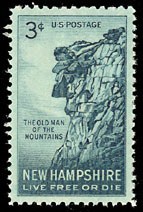by EarthSpirit Community on EarthSpirit Voices
Written by Cat Chapin-Bishop
I am a Yankee. Right down to my Pagan soul.
My understanding of what it means to be a Pagan is to try to live in right relationship with the gods, the land, and the people, including the ancestors. My gods are those that are comfortable in New England’s woods and hills. My land is this rocky landscape of New England. And my people and my ancestors–on Mom’s side, at least–are New Englanders: sea captains and dairy farmers, teachers and laborers. Whatever granite is in this place or in my ancestors lives on in me and in my Pagan practice.

And that granite is why I am so driven to speak out against racism.
To help me explain what I mean, I’m going to go ahead and borrow an ancestor: my friend Kirk White‘s father.
A Yankee like a Rock
Kirk’s ancestors, like mine, were among the first Englishmen to arrive in North America. Like mine, this landscape was where they found their home. And like me, my friend Kirk and his family before him has loved New England–Vermont in his case, Maine and Massachusetts in mine.
Now, Kirk grew up on the farm his family had owned for over a hundred years. Farming in New England, though, has never been an easy way to earn a living, and, like other families before and since, Kirk’s family found other ways to pay their bills. So when Kirk was growing up, his dad Ron was a contractor.
During the real estate boom of the 1970s, Ron got hired by a big developer to build houses for vacationers in Vermont. There was a lot of money changing hands.
Now, standard practice in construction, then and probably now, says that the people under you get paid when you get paid. So the construction workers get paid when the contractor gets paid, and the contractor gets paid when the developer gets paid. But sometimes, there are delays. And on this job, there were lots of delays.
People have to eat. Ron had a crew under him, filled with workers who needed to eat, and who couldn’t wait until next month or next year to do that. So Ron took out loans, and did what he had to do so that all the people working under him got paid. Because he knew what it was like, to need to feed your kids today on money you won’t have until tomorrow, and he wasn’t going to make people deal with that.
Then it turned out that that particular developer wasn’t going to pay anybody; his deals had gone sour. He declared bankruptcy, and Ron and his crew were way too far down on the food chain to ever get a share.
Ron had paid his workers. They were fine. But Ron’s debts were all in his own name, and he had no way to pay them. Worse: that was the year his house burned down. One of Ron’s sons died. His wife had a heart attack. It was just that kind of year.
The sensible thing to do would have been to follow the developer into bankruptcy, but Ron couldn’t make himself do that. He felt himself honor-bound to repay all those loans, all that money. No court would have held him to it–but his own integrity did. So he busted a gut doing every kind of work he could lay hands on. His wife went back to work, despite her heart. They couldn’t rebuild the house, so they moved into a trailer… and Kirk grew up in something very near poverty.
Ron scrimped and saved and drove himself for years and years… and in the end, he paid it all back. Every last dime.
Well, almost.
In the end, it was Kirk himself who paid that last $40,000, when he took possession of the farm–and the integrity–that came down in the family to him.
When I began working on this essay, I called him on the phone. I’d only heard the story once, though obviously it had left me with a strong impression. Then, after some basic fact-checking, I asked Kirk the question that had been on my mind. I asked if, growing up, he’d ever resented it–making do with so little when, if his Dad had been a little less unyielding, he might have had so much more.
“To be honest,” he said, “I never thought of it until just now, when you asked.”
He paused, thinking. “It always just seemed to me that it was the right thing to do–the honorable thing. I guess I just… admired him for it.”
And that, to me, is integrity. Integrity like bedrock, like the land itself.
When I say that “I’m a Yankee,” what I mean is, I consider myself to be walking in the footsteps of men and women like Ron White. Granite integrity may be hard to live up to, but like Kirk, that’s the kind of person I aspire to be.
That is what I’m proud of. But–and if you are a black or brown reader of this blog, you’re probably here way ahead of me–I don’t get to hold onto the pride of my heritage unless I’m willing to own the shame.
Receiving Stolen Goods
Our Yankee forebears were not innocent of the stain of racism. Neither, for that matter, am I.
I’m not just talking about slavery–though all the New England states had slavery; they just ended it a little sooner than other parts of the country. (Should we make a virtue out of having ended the theft of lives sooner–through a gradual emancipation–than other parts of the country? “We Stole a Little Less Than Some White People!” what a ringing endorsement of our integrity!)

I do not stand apart from these injustices. My ancestors profited from a system that marginalized and robbed people of color. Those sea captains I’m so proud to claim in my family tree? The New England shipping industry was built on the Triangular Slave Trade. Whether my direct ancestors ever participated is almost beside the point: the industry was created by it. Likewise Maine farmers owed their prosperity, in part, to supplying that same industry, before as well as after the abolition of the slave trade.
It would be one thing if the injustice had stopped when the Age of Sail had ended. Then I could at least hold my father’s side of the family innocent bystanders to the crimes of racism! But it’s not so.
Did you know, for instance, that Maine wouldn’t allow Native Americans to vote until 1953? And not only was the land I love so much stolen from its original owners, but Indian children, growing up in Maine, were stolen from their families in order to “kill the Indian” in them right up through the 1990s.
Then there are the ways that, during my lifetime and my parents’ lifetimes, my prosperity, as a white woman, was assured in part by denying people of color equal access to government help. From the benefits of the GI Bill to FHA loans, my government colluded with banks, realtors, and colleges to be sure that my (white) ancestors would prosper through programs deliberately designed to discourage access by people of color.
I never asked for this. My parents never asked for this. Nevertheless, the fact remains: my family’s prosperity was paid for in part by the marginalization of people of color, in New England and elsewhere.
Honoring my Ancestors; Honoring my Debts
Here’s what I conclude from all this: I owe a debt. If you are a white American, until and unless we stop getting preferential treatment in hiring, education, housing, and law enforcement, you owe a debt. Whether our specific ancestors ever intended to cheat anyone really is not the question–at least, not to me.
Ron didn’t set out to steal from anyone, after all. He didn’t sit back and say, “That was so long ago,” or “It wasn’t my fault,” or “It’s not my problem.” Knowing he had a debt, he worked until he managed to pay it back.
If I am to claim that bedrock as my own, can I do less? As Ta-Nehisi Coates has observed,
One cannot escape the question by hand-waving at the past, disavowing the acts of one’s ancestors, nor by citing a recent date of ancestral immigration. The last slaveholder has been dead for a very long time. The last soldier to endure Valley Forge has been dead much longer. To proudly claim the veteran and disown the slaveholder is patriotism à la carte.
What will honoring this debt entail? Will it involve reparations, a financial recognition of hardships imposed? Perhaps. At the very least, it will involve breaking the silence, listening to an honoring the experiences of people of color, and confronting the complicity of white Americans.
Racism exists. It hasn’t gone away, and in fact, it’s still killing people, still destroying lives.
I am a white American. I didn’t ask to have anyone cheated out of anything. I never signed up for it; I never wanted it. But I am also a Pagan and I honor my ancestors. Here is the lesson I choose to take from them: It doesn’t matter if it’s “not our fault.” Before there can be Reconciliation, there must be Truth.
We need to be like Ron. Pay our debts.
Speak the truth, work like hell, and pay that goddamn debt.
Cat Chapin-Bishop is a longtime member of the EarthSpirit Community and a regular presenter a A Feast of Lights. To hear more from her, check out her blog, Quaker Pagan Reflections, on the Patheos Pagan Channel, where this post was originally published in March of 2015. Special thanks to Cat and to Pagan Channel editor Jason Mankey for their assistance in allowing us to repost this.
